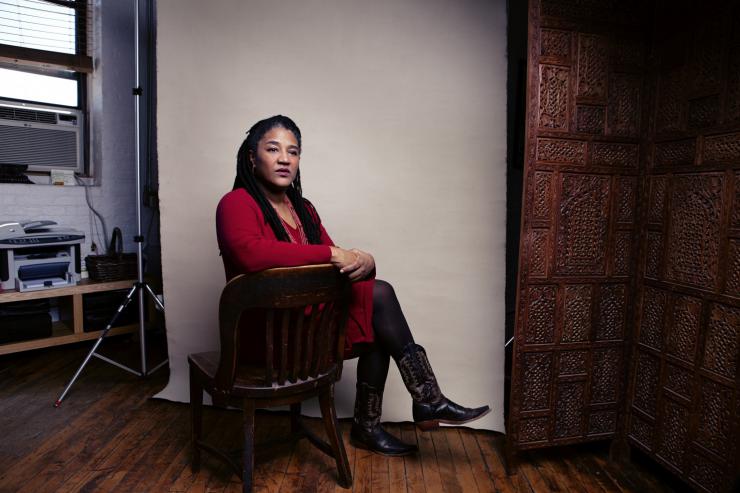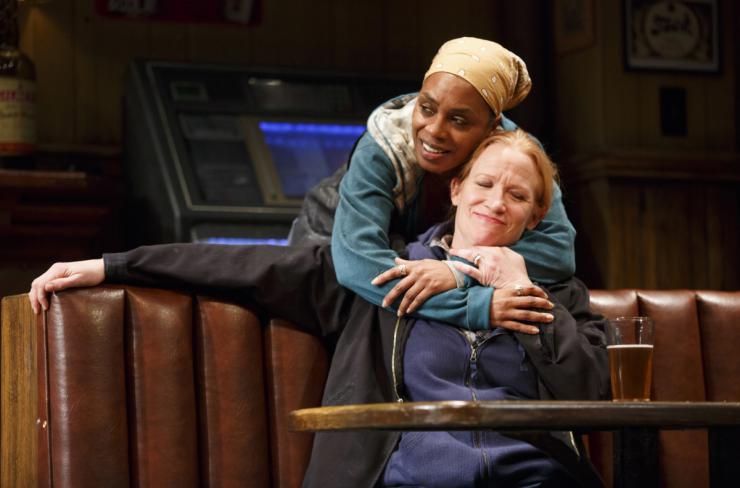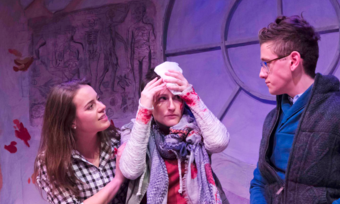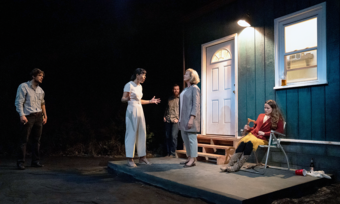A Lover's Guide to American Playwrights
Lynn Nottage
What do you make of artistic prophecy? I've been wrestling with the question myself, with the growing awareness that artists—playwrights in particular, the artists I know best—often seem to predict world events before they happen. A work of "science fiction" mentions the fall of the towers several years before the World Trade Center incinerates. I read a dark, futuristic tale set in greenhouse-like fortresses where the wealthy escape climate change, while their private armies keep the rabble outside the gates, and then I learn that wealthy New Yorkers keep fully staffed yachts docked on the Hudson to escape troubles to come.
Probably, artistic prescience is a kind of shadow seeing. Because it’s the job of art to notice the overlooked, and because writers are compelled by lives and stories often overshadowed by the glare from culture's dominating narratives, visionary artists get into those unseen spaces ahead of the rest of us. They try to shape the blur. They see, before we do, what's been right in front of our eyes.
A red-hot compassion has taken Lynn Nottage on a journey across time and continents—from 1930s Hollywood to post-millennium Kenya, Uganda, and Tanzania, from the excavation of the Panama Canal to the ruins of de-industrialized Reading—a trip that has finally landed her on a street known for its "Great White"-ness: Broadway.
I've never forgotten a speech playwright Doug Wright made when presenting a Village Voice Obie Award to Tony Kushner for Homebody/Kabul. Wright expressed his gratitude that while most Americans slept in our ignorance about Afghanistan—including, probably, where in the world it was—there had been a playwright obsessing about it. Kushner started writing his play about the rabbit-hole lure of Kabul four years before we went to war there, and finished it around the time President Bush started sending in troops. And now there is Sweat, Lynn Nottage's strangely predictive and deeply compassionate portrait of what has maddeningly come to be known as Trump's America: a steel factory town modeled on Reading, PA, in the years of industrial decline leading up to the 2016 election.
In her 2003 essay, "A Playwright's Confession #4: Reflecting on a Failed Production," published in New Dramatists' short-lived journal @nd..., this same Lynn Nottage describes the way history treated another example of her artistic prescience, a satire called Por’Knockers. Por'Knockers follows a group of inept African-American "radical idealists," who blow up an FBI building and inadvertently kill a group of schoolchildren. Lynn began the play as a comedic investigation of "how disaffection can lead people to commit unspeakable acts in the name of justice." The Oklahoma City bombings changed all that. What had seemed "daring, engaging and humorous" in an early showing—pre-Oklahoma City— was rendered, by real-life events, "dead on arrival."
Lynn, who began her professional life in the press office of Amnesty International, used the play's tonal one-eighty, plus its subsequent demise in production at New York's Vineyard Theatre, to question our appetite for political theatre:
We claim to crave political theatre, but more often than not, what we’re actually craving is for our views to be reinforced. How many of us truly want to be challenged? I confess that sometimes it seems much easier to argue about world peace over the dinner table, than to fight for it in the streets. I confess that sometimes I permit my imagination to pave the roads and feed the hungry, father than lifting a single finger to help. And yes, I confess that sometimes I feel politically involved because during my incessant channel surfing I linger for ten minutes on a documentary about the plight of the Kurds, and actually fell a tinge of guilt and compassion. The collective outrage that governed and reshaped the country in the sixties has been replaced by a tacit complacency. Passion and idealism have become relics of another age. We give money and go to the theatre, but what happens to our culture when the artists are no longer allowed to raise the difficult and challenging questions in their work? What happens when our money goes to direct mail houses in Washington, DC, rather than into advocacy programs that they advertise? Do we then stand up? We’ve become a reactive country, mustering outrage only when it’s too late. We simmer, we stew, but very rarely do we boil. And then the reality of war is brought home, and we take a stand when it’s too late.
Let us now, then, praise playwrights who simmer and stew. Let us celebrate one in particular who also boils, putting her imagination where her outrage is. A red-hot compassion has taken Lynn Nottage on a journey across time and continents—from 1930s Hollywood to post-millennium Kenya, Uganda, and Tanzania, from the excavation of the Panama Canal to the ruins of de-industrialized Reading—a trip that has finally landed her on a street known for its "Great White"-ness: Broadway.

Lynn Nottage's imagination is rangy and bottomless. In plays as varied as Intimate Apparel; Fabulation, or the Re-Education of Undine; Las Meninas; and Ruined, she writes exquisite realistic portraiture, audacious urban satire, wild epic history, and powerful political drama. In Sweat she re-invents 1930s social realism for a new millennium. Her picture of impoverished post-industrial America, told through the lives of two women—one black, one white—and their sons, is complicated not only by anguish, but also by the playwright's decades of fearless thinking about race, ethnicity, class, and gender.
What can’t Lynn Nottage do? Hers is a voice of many voices, each rooted in the full, changeable humanity of the characters she imagines. A teacher of mine once made a distinction between invention and imagination. It stuck with me, and I understand this distinction more deeply in light of Lynn’s rich, varied body of work. Invention, he argued, is a kind of crafty brilliance, the ability to fashion things together in smart, entertaining ways. (Think Tom Stoppard.) Imagination runs deeper, is more penetrating, more rooted in empathy. Through imagination we release the boundaries of the self—maybe even the pride in the brilliance of the self—to find our way to the other.
As she's shown in her wild comedic works—Fabulation; Mud, River, Stone; By the Way, Meet Miss Vera Stark—Lynn can invent and entertain like nobody's business. But compassionate imagination—walking in another's skin, seeing through another's eyes, living in another's village—is her defining gift, as though she means to change the world through empathy.
Listen to George from Intimate Apparel, a worker in the Panama Canal, 1905 writing to a woman in New York he’s never met:
It dawn. No work has begun, the morning is still holding the ocean, not yet blue. But I can see past everything green to the horizon. And it is here in the half-light that I imagine you. Six months have passed since our first correspondence, and much has changed. A water boy from my parish died, taken by fever two nights past. All their magic machinery and there’s nothing could be done for this boy. It got me thinking about his family behind and the wife he’d never meet. He die so easy. Why he? His young life end, and not more than a word from the Yankee chief, ‘cept regret that the new boy ain’t so quick. This morn I try to remember his small blackened face and cannot even recall his smile, though his hand give me water each and every day since I be here. Why this boy go out my mind, I ask? Tomorrow I too could be sucked into the ground without tears and ride the death train that pass through here five times a day. [...] America sounds like a wondrous place, a man such as myself would be willing to surrender much for a taste of the modern world. Yes, I see beyond the tilting palms, through the mangroves and across the Caribbean sea to where you sit. I kneel beside you at this moment and I tell you, I am a good strong man. What I’ve come to feel for you can best be described as love. I love you. There is no other way to say it, will you marry me?
This letter, which George dictates, is itself an exercise in imagination. He imagines Esther, the distant woman he hopes to marry. He imagines the family of the boy he watched die. He even imagines his own death, and his way across the sea to his correspondent.
Then there’s Undine in Fabulation, a twenty-first-century black publicist on her inexorable way straight down, through a Vanity Fair pageant of scandal, bankruptcy, welfare, prison, twelve-step programs, and a kind of mid-life teen pregnancy. Her voice, which couldn't be more unlike George's, is also a kind of dictation, because the woman Undine is, in fact, self-fabricated, from a Brooklyn kid named Sharona Watkins.
Actually, this is where the story will begin. It is mid-thought, I know, but it is the beginning. In the next twenty seconds I will experience a pain in my chest so severe, that I’ve given it a short simple ugly name. Edna. Forgive me, I am Undine Barnes Calles. Yes. I left home at thirteen. I was a bright child. I won a competitive scholarship through a better chance program to an elite boarding school in New England. I subsequently acquired a taste for things my provincial Brooklyn upbringing could no longer provide. I went to Dartmouth College, met and mingled with people in a constructive way, built a list of friends that would prove valuable years down the line. And my family ...they tragically perished in a fire, at least that’s what was reported in Black Enterprise. It was a misprint, but I nevertheless embraced it as the truth. Fourteen years ago, I opened my own very fierce boutique PR firm catering to the vanity and confusion of the African American nouveau riche. And all seemed complete when I met my husband Hervé at a much too fabulous New Years Eve Party at a client’s penthouse. Eleven months later we married.
If there's a thread connecting Lynn’s varied works, it's the force of will her characters draw on to survive and rise above the hostile worlds they inhabit. There is fight in every one of her people, for good or ill, and they need it. This tenacity is most apparent in the women of Ruined, who take refuge, if you can call it that, working at Mama Nadi's mining town brothel in war-torn Congo. Each one has a story, a life that led her to Mama’s, such as the one told by the nineteen-year-old Salima:
I was working in our garden, picking the last of the sweet tomatoes. I put Beatrice down in the shade of a frangipani tree, because my back was giving me some trouble. [...] Where was [my husband] Fortune? He was in town fetching a new iron pot. "Go," I said. "Go, today, man, or you won't have dinner tonight!" I had been after him for a new pot for a month. And finally on that day the damn man had to go and get it. A new pot. The sun was about to crest, but I had to put in another hour before it got too hot. It was such a clear and open sky. This splendid bird, a peacock, had come into the garden to taunt me, and was showing off its feathers. I stooped down and called to the bird: "Wssht, Wssht." And I felt a shadow cut across my back, and when I stood four men were there over me, smiling, wicked schoolboy smiles. "Yes?" I said. And the tall soldier slammed the butt of his gun into my cheek. Just like that. It was so quick, I didn't even know I'd fallen to the ground. Where did they come from? How could I not have heard them?
[...]
One of the soldiers held me down with his foot. He was so heavy, thick like an ox and his boot was cracked and weathered like it had been left out in the rain for weeks. His boot was pressing my chest and the cracks in the leather had the look of drying sorghum. His foot was so heavy, and it was all I could see as the others...'took' me. My baby was crying. She was a good baby. Beatrice never cried, but she was crying, screaming. "Shhh," I said. "Shhh." And right then... (Closes her eyes) A soldier stomped on her head with his boot. And she was quiet.
I find it telling that Lynn set out, in Ruined, to adapt Bertolt Brecht's Mother Courage and Her Children and then, through the power of the stories she encountered on successive trips to Africa, left her original source behind (though it remains as structural pentimento). She cannot resist the fullness of humanity she encounters. She cannot resist the urge to flesh stories out, to bring even the smallest characters into a roundness of existence. She cannot resist, as in Sweat, allowing them the deep trouble of their complex relations—black with white, poor with poorer, American with Columbian, young with old, able with disabled. Lynn compels us with the distinction of all these disparate voices, and with the awareness that, as we make our ways through the world, as we make our ways to each other, imagination is our most nimble, far-seeing ally.
It's hard to think of another American playwright—with the possible exception of her new Broadway neighbor J.T. Rogers—who covers as much of the literal map as Lynn does. She crosses boundaries between nations and then between people, through affection, proximity and flight, and the consequences are transformative. In the seventeenth-century period drama Las Meninas, the African dwarf Nabo arrives in a box delivered to the court of Louis the XIV; Nabo begins a love affair with the Queen, Marie-Therese, herself a border crosser from Spain. In Fabulation Undine moves away from the projects and then plunges back into them. A silent, painful love grows—expressed by no more than the forbidden touch of a finger to a shirt collar—between Esther, an African-American seamstress and Mr. Marks, an orthodox Jew in Intimate Apparel.

In technique Lynn reminds me of no one so much as Rembrandt: the ability to alternate long, group scene with almost excruciating intimacy, the richness of human detail, the way faces—or in her case people etched in dialogue—seem to contain not only character but life. Her imagination is precise and elaborate at once, and when we apprehend its method, as at the end of Intimate Apparel, it's stunning. After two hours of following the hope, concessions, love, and losses of the sewing woman, Esther, a title is projected on the back of the stage: “Unidentified Negro Seamstress. Ca. 1905.” In an instant we understand we’ve been watching a picture, a postcard, a used bookstore find made real.
Lynn Nottage is a collector of stories, an unearth-er of histories buried and boxed, denied by the powerful or decapitated in the woods, lost in the shuffle of family mementoes. She traveled to East Africa to interview women fleeing the endless armed conflict in the Democratic Republic of Congo. She continues to return to Reading, PA with her husband, filmmaker Tony Gerber, to collect and make public art out of stories from the fall and rebirth of that struggling town via a site-specific, multimedia installation. This is the work of an artist as important as she is impressive. Moreover, it's the work of a citizen-artist, a phrase of aspiration these days, and one that is, in this case, undeniably deserved.
I remember the wonderful playwright Marcus Gardley describing the black playwrights convening held in 2010 at the American Voices New Play Institute at Arena Stage. Before Lynn Nottage arrived, as Marcus told it, the other playwrights got to talking about her. Each one of them had a story to tell about her generosity, kindness, and mentorship. There was the call she made when somebody needed encouragement or the dinner she bought after another writer's bad review, her kind words about a play. The explicit moral of Marcus's story echoes what many know to be true about Lynn and what you intuit through her plays: She is—in addition to being a world-class playwright—a world-class teacher (presently at Columbia), leader, and human being. She now adds to this litany Broadway playwright and the distinction of being the first woman to win two Pulitzer Prizes for Drama.
Lynn has simmered and stewed, and she has stood up. She has thrown her many voices into the many places she has journeyed. In my own imagined (hopeful) world, her multi-dimensional, ambitious compassion is the coin of the future, the currency of a most humane prophet.










Comments
The article is just the start of the conversation—we want to know what you think about this subject, too! HowlRound is a space for knowledge-sharing, and we welcome spirited, thoughtful, and on-topic dialogue. Find our full comments policy here
Thank you Todd for writing such a heart felt and superbly articulated article. It inspired not only my appreciation for Lynn's voice and body of work, but a reminder of what deep purpose play writing can serve. Your comment: 'Through imagination we release the boundaries of the self—maybe even the pride in the brilliance of the self—to find our way to the other.' Much to contemplate here.
Todd, I was a convert ever since I read Crumbs From the Table of Joy. I knew then that the world would one day be on their knees over Lynn's volcanic talent. This piece is beautifully written and right on the money. Thank you for sharing it. This is Lynn Nottage's reign and to that I say, HAIL!
Thanks again, Todd. Articulate love.
Beautifully written article! Thank you, thank you for articulating so eloquently about a great playwright.